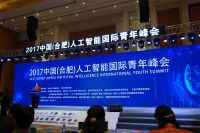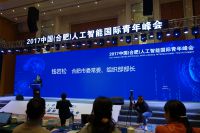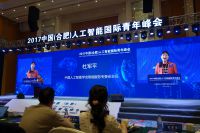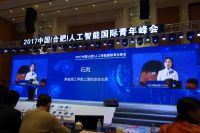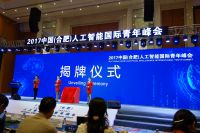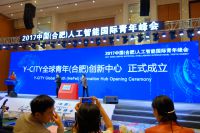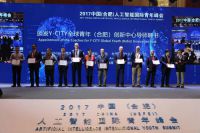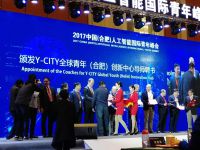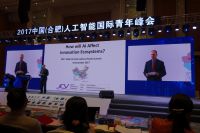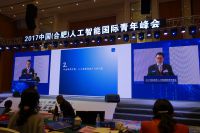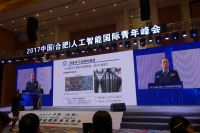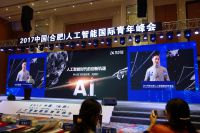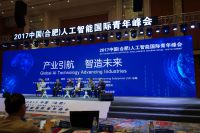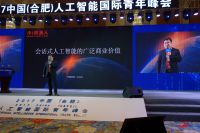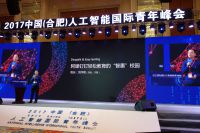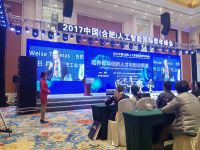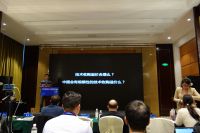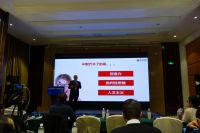Today, I had the honor to attend and even speak at a panel of the China (Hefei) Artificial Intelligence International Youth Summit [中国(合肥)人工智能国际青年峰会] organized under the guidance of the Chinese Association for Artificial Intelligence [中国人工智能学会] (CAAI) and the China Computer Federation [中国计算机学会] (CCF) as the delegate of our university [合肥学院]. The conference was a very nice experience and I enjoyed the different talks and discussions at the event. Here I want to shortly summarize some impressions. The summit agenda is preserved here.
The conference was opened by Mr. Yansong Qian [钱岩松] from the Hefei Municipal Government, Prof. Junping DU [杜军平] of the CAAI, and Mrs. Lan SHI [石岚], chairwoman of the Y-CITY Global Youth Innovation Platform [Y-CITY全球青年创新]. The opening remarks were followed by the official opening ceremony of the Y-CITY Global Youth (Hefei) Innovation Center. After this short ceremony, twelve experts (including Prof. Thomas Weise) were awarded Y-CITY Global Youth (Hefei) Innovation Center [Y-CITY全球青年(合肥)创新中心] tutor appointments.
The first keynote speech was "The Innovation Ecology and the Future World in the AI Era" [AI时代的创新生态与未来世界] by John Chisholm, the CEO of John Chisholm Ventures. He asked "How will AI affect innovation ecosystems?" and described the network of suppliers, companies, and customers as an ever-changing, self-organizing complex adaptive system, hard to predict, especially since new technologies emerge all the time. This also offers chances for everyone, since everyone has a unique set of skills. The second keynote speech was given by Henry CAI [蔡洪平], the chairman of Asia-Germany Industrial Promotion Capital, under the theme "From Global to China - How AI Build New Industrial Kinetic Energy" [从全球到中国,人工智能构建产业新动能]. He found that China was left behind by other countries in the Qing dynasty, but now is at the forefront of the fourth industrial revolution. He hopes that the tremendous developments in terms of automation and artificial intelligence will lead to a more comfortable life for everyone, by reducing our working time step-by-step from five days per week to eventually only two. The third talk in the morning session was "The AI And Human Brain" [类脑人工智能] by Feng WU [吴枫], the Executive Director of the [信息科学技术学院] of my former university, the University of Science and Technology of China [中国科学技术大学] (USTC). Prof. WU showed us the very impressive achievements of his group in better understanding how brains work and transferring this knowledge to create better AI and better hardware. The last speech before the panel discussion was "A New Generation of AI Platforms" [新一代人工智能平台] by Xiaoru WU [吴晓如], the co-founder of iFLYTEK [科大讯飞], the company which developed the "Chinese Siri". iFLYTEK is maybe the most innovative company in Anhui, who made tremendous achievements in both language processing and machine learning. They not just win several international research challenges but also make much of their software accessible as open source. Director WU envisions that within ten years, language will no longer be a barrier, as automated translation will become sufficiently fast and reliable. He also points out that it often is a long path from research to a successful product.
These four talks were followed by the panel discussion "Global AI Technology Advancing Industries" [产业引航,智造未来] hosted by Lan SHI [石岚] and featuring prominent members such as Enhong CHEN [陈恩红], the Vice-Dean of my former School of Computer Science and Technology [计算机科学与技术学院] at Jin TANG [汤进], the Deputy Director of the School of Computer Science and Technology [计算机科学与技术学院] at Anhui University [安徽大学], Andre Gisiger, President at International Learning Enterprises (ILE), Yunquan ZHANG [张云泉], Director of the National Computing Center in Jinan [国家超级计算济南中心], and Jeffrey Bernstein, the founder and CEO of the My Job Tank Inc. In this panel, it became again clear that China wants to take the lead in the new age of AI and attaining this goal seems very realistic. This development offers a lot of opportunities, especially for young talents.
The first keynote speech after the lunch break was "The Current Landscape and Technology Imagination of AI" [人工智能的现状与技术畅想] by PP ZHU [朱频频], the CEO and CTO of I Robot [小机器人], who showed that AI can become an efficient communication partner for humans. Then, Zuohe LIU [刘作和], CEO of Hangzhou Qing Song Education & Technology Co. Ltd. [杭州轻松教育科技], presented his insights on the "Smart Campus" [智慧校园]. It became clear that intelligent technologies can indeed be a great support for making the life of students on campus and their parents easier. Easy management can be achieved by the software-as-a-service paradigm.
After this insightful talk, it was my turn to join the panel discussion "Cultivating Young Talents in Innovation and Entrepreneurship" [培养青年创新人才与创业精英] with John Chisholm, Richard Hong [洪日昌], Professor at the School of Computer and Information [计算机与信息学院] of the Hefei University of Technology [合肥工业大学], and Prof. Junping DU [杜军平], which was hosted by Xing MENG [孟醒], Vice-President of Shun Wei Capital [顺为资本]. In this discussion, John Chrisholm expressed that he considers passion and perseverance as the most important features. I full agree with this answer, I think enthusiasm and stamina are the key to success. The former to enable you to learn, explore, adapt, and the latter to deal with hardships and failure, both small and large.
Due to being occupied with an interesting discussion in the foyer, I unfortunately missed most of the talk "Investment Opportunities For AI" [AI的投资机会] of Xing MENG [孟醒]. The final talk I saw at the conference was the keynote "AI Employment and Career Development" [AI就业与职业发展] by Jeffrey Bernstein, who outlined qualities that cannot be replaced by AI and how studying abroad can help attaining them.
Summary
All in all, this was a very, very interesting event and the organizers did a marvelous job. All talks were highly interesting.
Key technologies mentioned in several talks are deep learning, in particular with neural networks, and other machine learning technologies. Cloud Computing was often given as the method of choice to create maintainable solutions and to handle the high computational load caused by AI applications. These technologies have arrived in our products today. Another key aspect of the new "Era of AI" is a high degree of automation, as prescribed by Industry 4.0 and Made in China 2025 [中国制造2025].
This summit showed how thriving, lively, energetic, and quickly developing the AI industry in China is. If this development can be sustained, I believe we are truly approaching a new era where automation and computational intelligence can make our lives much easier. Teaching the young talents for this era falls into the responsibility of universities and universities of applied sciences, such as Hefei University. As several of the speakers pointed out today, a lot of our graduates will work in jobs in twenty years from now that do not even exist today. This again shows the importance of lifelong learning.

![The first poster image of the China (Hefei) Artificial Intelligence International Youth Summit [中国(合肥)人工智能国际青年峰会]. poster_image_1](http://iao.hfuu.edu.cn/images/events/2017/20171208_hefei_ai/thumbs/poster_image_1.png)
![The second poster image of the China (Hefei) Artificial Intelligence International Youth Summit [中国(合肥)人工智能国际青年峰会]. poster_image_2](http://iao.hfuu.edu.cn/images/events/2017/20171208_hefei_ai/thumbs/poster_image_2.png)
